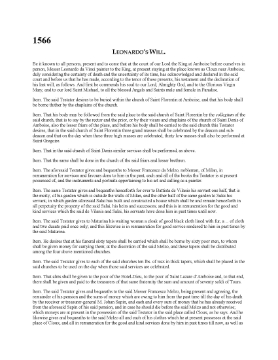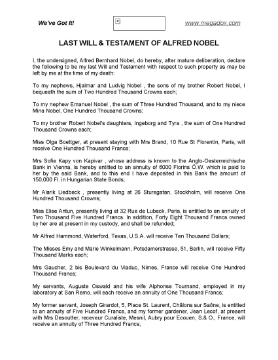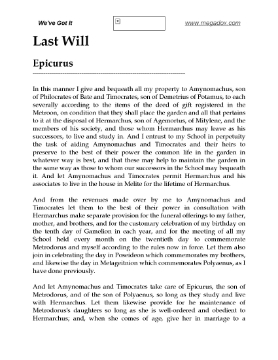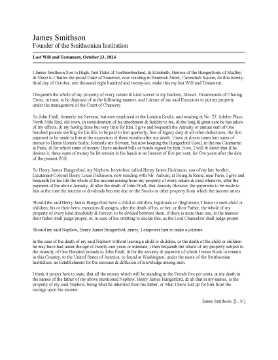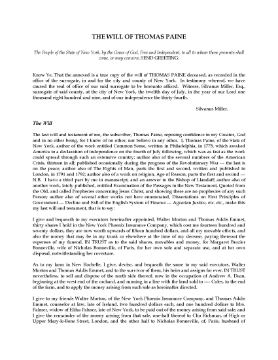Product tags
- free celebrity wills (85)
Related products
Leonardo da Vinci Last Will
This is a copy of the Last Will of the maestro Leonardo da Vinci (1452-1519).
- Leonardo was an Italian painter, sculptor, architect and engineer, musician, scientist, mathematician, inventor, botanist, anatomist, and cartographer. He is considered the archetypal Renaissance man, and is perhaps the most diversely talented person ever to have existed. A brilliant artist and inventor, his use of logic and empirical methods were unusual for his time.
- To the average person, Leonardo has always been known primarily as a painter. His most famous works, the Mona Lisa and The Last Supper, are the most reproduced and most parodied paintings of all time. His drawing of the Vitruvian Man is also an instantly recognizable cultural icon, having been reproduced on everything from the Euro to T-shirts.
- In addition to the brilliance of his artistic endeavours, Leonardo's drawings show that he conceptualized prototypes for the helicopter, the tank, concentrated solar power, a calculator, the double hull, and a rudimentary theory of plate tectonics. He also invented an automated bobbin winder and a machine for testing the tensile strength of wire, and these devices were manufactured during his lifetime.
- As a scientist, he greatly advanced the state of knowledge in the fields of anatomy, civil engineering, optics, and hydrodynamics.
Source: Wikipedia.org
$0.00
Alfred Nobel Last Will and Testament
Download this free copy of the Last Will and Testament of Alfred Nobel (1833-1896).
- Nobel was born in 1833 in Stockholm, Sweden. His family was descended from Olof Rudbeck, the best-known technical genius of Sweden's 17th century era as a great power in northern Europe.
- Nobel invented dynamite in 1866.
- In 1895, Nobel signed his last will providing for the establishment of the Nobel Prize. He died in San Remo, Italy on December 10, 1896.
$0.00
Epicurus Last Will and Testament
This is a copy of the Will of Epicurus (341 BC-270 BC).
- Epicurus founded one of the major philosophies of ancient Greece, helping to lay the intellectual foundations for modern science and for secular individualism.
- Many aspects of his thought are still highly relevant some twenty-three centuries after they were first taught in his school in Athens, called 'the Garden.'
- Epicurus's philosophy combines a physics based on an atomistic materialism with a rational hedonistic ethic that emphasizes moderation of desires and cultivation of friendships.
- His world-view is an optimistic one that stresses that philosophy can liberate one from fears of death and the supernatural, and can teach us how to find happiness in almost any situation.
- His practical insights into human psychology, as well as his science-friendly world-view, gives Epicureanism great contemporary signficance as well as a venerable role in the intellectual development of Western Civilization.
The above taken from www.epicurus.net
$0.00
James Smithson Last Will and Testament
This is a copy of the Last Will and Testament of James Smithson, who founded the Smithsonian Institution (1765-1826).
- James Smithson was a chemist and mineralogist in the late 1700s.
- He made numerous excursions throughout Europe to collect mineral and ore samples.
- He was made a member of the Royal Society of London in 1787 only a year after he graduated from college.
- His concise one-page Will set up a fund which established the Smithsonian Institution.
$0.00
Thomas Paine Last Will
Download this free copy of the Last Will of Thomas Paine (1737-1809).
- Thomas Paine was a radical, inventor, intellectual, revolutionary, and one of the Founding Fathers of the United States, who is probably best known for writing the pamphlet "Common Sense", advocating America's independence from Great Britain, and for his book The Age of Reason which promotes reason and free thinking and argues against institutionalized religion.
- Paine was deeply involved in the early stages of the French Revolution. Despite not speaking French, he was elected to the French National Convention in 1792. The Girondists regarded him as an ally, so, the Montagnards, especially Robespierre, regarded him as an enemy. In December of 1793, he was arrested and imprisoned in Paris, then released in 1794. Paine remained in France during the early Napoleonic era, but condemned Napoleon's dictatorship, calling him "the completest charlatan that ever existed".
- In 1802, at President Jefferson's invitation, he returned to America where he died on June 8, 1809. Only six people attended his funeral as he had been ostracized for his attacks of Christianity.
Source of information: Wikipedia.org
$0.00

